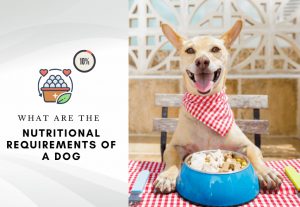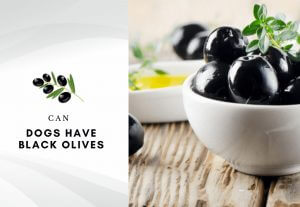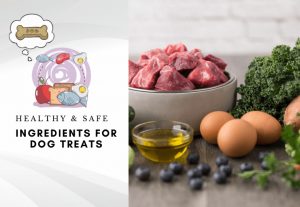One of the most common questions from pet parents is what they should offer their dog to eat?
The simple answer is what your dog likes the most.
It may look ambiguous at this time. But worry not as we are going to discuss dog nutritional requirements percentages in detail.
Offer your dog whatever you want and whatever you think is essential for their health. No pet parent would like to impose health issues on their dog just because of poor feeding.
The only thing that matters the most is the provision of nutrient-rich food. Moreover, make sure the diet you are offering to your furry companions is balanced and complete and fulfills the dogs’ nutrient requirements.
How would you do it?
You can start by checking the labels of commercial food packages, which depict nutritional adequacy via clear-cut statements.
The statement should promise that the food is suitable for all life stages or adult maintenance.
Moreover, in the case of homemade food, you must be pretty sure that your dog is getting an appropriate mix of fats, proteins, minerals, and vitamins.
Therefore, this article will help you to understand the basic nutritional requirements for a dog.
You will also learn about dog nutritional requirements percentages to maintain optimum health;
- What essential nutrients do dogs need in homemade dog food?
- What vitamins and minerals are required in dog nutrition?
- Dog nutritional requirements percentages
- Dog nutritional requirements for different scenarios
- The best way to feed your dog: Human grade pet food
- FAQs
Let’s start.
What Essential Nutrients Do Dogs Needs in Homemade Dog Food?
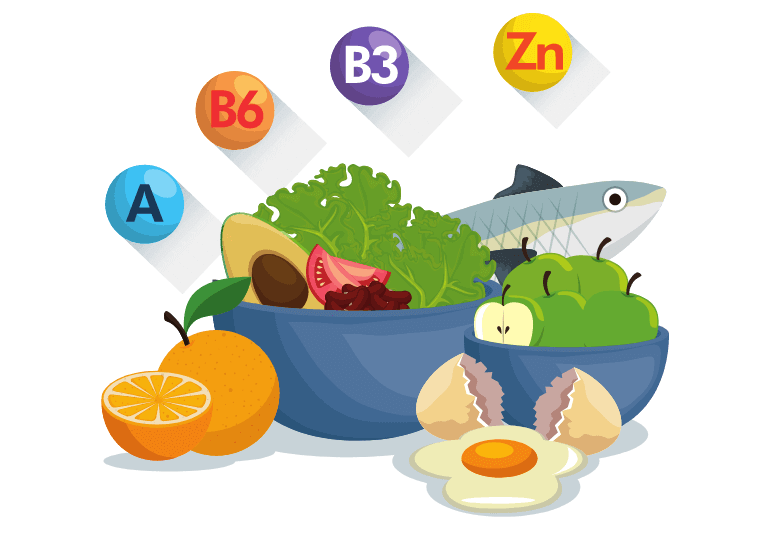
The well-being of your dog depends on the provision of essential nutrients to fulfill its nutritional requirements.
It doesn’t matter whether it’s homemade or commercial food you are serving to your dog. Just ensure that your dog has a balanced diet.
Following are the essential nutrients that must be present in a dog’s diet to fulfill its nutritional requirements.
1- Proteins
Balanced and complete nutrition provides an adequate amount of protein along with other nutrients.
For example, a balanced homemade dog food diet must provide the essential ten essential amino acids that are the precursor of proteins.
Proteins are the building blocks of body tissues like nails, hairs, skin coats, etc., that are needed for the normal functioning of a dog’s body.
An adult dog requires 2.62 g of protein per kilogram metabolic bodyweight per day.
2- Fats
Fats are the source of energy that must be included in the nutritional requirements for a dog. They help in the promotion of healthy skin and hair. Moreover, several fatty acids play a role in immunity and joint support, including:
- Omega-3
- Omega-6
- Linoleic acid
On average, an adult dog requires 5% fats or 1.3 g per kilogram of metabolic body weight per day.
3- Carbohydrates
The primary source of carbohydrates in plants must be present in adequate quantity in homemade dog food. When you add vegetables, grains, and fruits to your dog food, they will get:
- Starches
- Sugars
- Fibers
These have an excellent impact on the digestive system and provide an energy source for your dog’s body.
4- Minerals and Vitamins
Minerals and vitamins are integral parts of a balanced homemade dog food diet. Any deficiency may cause serious health complications in dogs.
They are involved in various chemical reactions and building various structures like bones. A balanced dog diet should contain all the essential minerals and vitamins, including:
- Vitamin A
- Vitamin D
- Vitamin E
- Vitamin K
- B-complex
- Phosphorus
- Calcium
Vitamin C is not necessary for a dog’s diet as it is automatically formed within its body. Therefore, a dog taking a balanced homemade diet does not require minerals and vitamin supplements.
5- Water
Dogs survive if they lose half of their body proteins and body fat, but they can’t survive even losing 10% water. This is because more than half of the dog’s body weight is made up of water.
Therefore, it is crucial to carry out metabolic and enzymatic reactions.
No doubt, you add water in homemade dog foods but don’t forget to leave your dog access to plenty of clean and fresh water.
What Vitamins and Minerals Are Required in Dog Nutrition?

Vitamins and minerals are essential components of nutritional requirements for a dog. Therefore, you need to be sure that your dog is getting the right minerals and vitamins in its diet.
These essential minerals and vitamins make the dog’s body strong enough to combat diseases, enhance energy level and ultimately maintain its optimal health status.
A balanced dog diet must contain the following minerals and vitamins to fulfill the nutritional requirements.
We have also made it easy for you by mentioning their sources. You can easily add these ingredients to homemade dog food to ensure their provision to your dog.
Vitamins
Some important vitamins and their sources are:
- Vitamin A – liver, pumpkin, fish oil, spinach, eggs, sweet potatoes, turnip greens, and carrots
- Vitamin D – Egg yolks, marine fish oil, liver, cottage cheese, beef, fatty fish, and dairy products
- Vitamin E – Seeds, plant oils, whole grains, bran, wheat germ, leafy vegetables, and liver
- Vitamin K – Milk, leafy vegetables, cabbage, liver, and fish
- Vitamin C – organs meat, vegetables, and fruits
- Vitamin B – liver, spirulina, dairy products, whole grains, beans, nutritional yeast, green vegetables, nuts, brewer’s yeast
- 8-in-1 Formula - Zesty Paws Multifunctional Bites are functional supplement chews with premium ingredients and multivitamins that support physical performance, antioxidants, hip & joint, heart, immune, skin, liver, & gut health for dogs of all ages, breeds, and sizes.
- Skin Health & Antioxidants – For animals with sensitive skin, this formula contains Cod Liver Fish Oil and Vitamin E for skin and coat health to help maintain normal moisture and Kaneka Q10 to help reduce oxidative stress - plus they contain no grain, corn or soy derivatives!
- Hip, Joint & Performance Support - Each dog chew features OptiMSM, a premium form of MSM for muscular support, which works synergistically with the Glucosamine HCl and Chondroitin Sulfate in these chews for hip and joint support plus Cod Liver Oil and B-Complex Vitamins support normal physical performance.
- Gut Health & Probiotics - These chews also contain a five-strain Probiotic Blend (500 million cfu per chew), Digestive Enzymes, and Niacin to promote healthy digestion and gut flora while supporting normal bowel function for dogs.
- Heart, Liver & Immune Health - Multifunctional Bites feature powerful antioxidants Kaneka Q10, a premium CoQ10, Cod Liver Oil and Vitamins A, C, & E to promote healthy cardiovascular function, support liver health and enhance immune response.
Prices pulled from the Amazon Product Advertising API on:
Product prices and availability are accurate as of the date/time indicated and are subject to change. Any price and availability information displayed on [relevant Amazon Site(s), as applicable] at the time of purchase will apply to the purchase of this product.
Minerals
Usually, two types of minerals come under the dog nutritional requirement. These are:
1- Macrominerals
- Calcium – raw bones, milk, sardines including bones, broccoli, yogurt, cauliflower, green beans, and raw bones
- Potassium – vegetables, fruits, grain, and milk
- Phosphorus – Milk, eggs, fish, animal tissues
- Chloride – Milk, grain, fruits, and vegetables
- Magnesium – Beans, tomato juice, broccoli, spinach, seafood, whole grains, green beans, and tofu
- Sodium – Milk, vegetables, fruits, and grains
2- Micronutrients
- Zinc – Beef, whole grains, spinach, vegetables, broccoli, poultry, and yogurt
- Sulfur – Protein foods (eggs, legumes, meats, fish, and milk)
- Iron – Poultry, shellfish, legumes, red meats, fish, and eggs
- Iodine – Seafood, kelp, iodized salt, and dairy products
- Cooper – seafood, seeds, legumes, whole grains, nuts, and seeds
- Selenium – meat, brown rice, seafood, whole grain, and vegetables
- Chromium – vegetable oils, lean meat, and brewer’s yeast
- Manganese – Leafy vegetables, nuts, and whole grains
- Cobalt – fruits, kidney, liver, and vegetables
- Molybdenum – cereals, legumes, and organ meats
- Fluorine – from water
- Silicon – vegetables, peas, cereals, and beans
Dog Nutritional Requirements Percentages

Nutritional requirements for a dog vary depending on the dog’s age, activity level, and breed. The percentages of each nutrient are recommended by AAFCO, which depicts each nutrient’s percentage in each meal. Let’s try to understand the dog nutritional requirements percentages for essential nutrients.
1- Protein Percentage for Dogs
According to AFFCO recommendations, adult dog food must comprise 18 % or more protein. On the other hand, the minimum protein requirement for reproduction and growth stages of dogs must be 22%. In addition, working dogs require more protein for energy, which is about more than 30% of their meal.
In an adult dog diet, the ratio of other components to proteins must be 5:1 approximately.
2- Fats Percentage for Dogs
Dogs require fats as a powerhouse and to maintain a healthy coat and skin. The recommended fat requirement for a working dog is more than 50% due to their strenuous routine. In contrast, only 5% of fats are enough for an adult dog. Likewise, 8% of fats must be part of dogs in reproductive and growing stages.
The recommended ratio for other dog food components to fat is 20:1.
3- Carbohydrates
Carbohydrates are the source of energy for dogs that play a key role in avoiding protein conversion to glucose. In addition, fibers in carbohydrates are responsible for enhancing gut mobility, thus aid in digestion.
However, AAFCO provides no recommendations for carbohydrates, so you have to consult a veterinarian or canine nutritionist.
4- Minerals and Vitamins
- NATURAL ADVANCED FORMULA VITAMIN AND MINERAL SUPPLEMENT PROMOTES HEALTH AND ENERGY in young active puppies, working, or senior dogs.
- 365 DELICIOUS DAILY USE TABLETS can be given as a chewable treat or crumbled into food. Dogs love eating these delicious liver flavored treats.
- HIGH QUALITY SOURCE OF PROTEIN promotes skin and coat to help your dog stay healthy and look great.
- CERTIFIED SAFE by Independent Lab. Microbiological tested for EColi, Salmonella, Staphlococcus Aureus, Coliforms, Yeast, Mold & More.
- MADE RIGHT HERE IN THE USA in Federally Regulated Manufacturing Facilities in Small Batches for Quality and Freshness.
Prices pulled from the Amazon Product Advertising API on:
Product prices and availability are accurate as of the date/time indicated and are subject to change. Any price and availability information displayed on [relevant Amazon Site(s), as applicable] at the time of purchase will apply to the purchase of this product.
Minerals and vitamins play a key role in chemical reactions and structural building. That’s why they are essential nutrients in nutritional requirements for a dog.
As far as calcium percentage is concerned, it should be 1% for puppies and dogs in reproductive stages, whereas it must not be lower than 0.6% for an adult dog.
Similarly, 0.8% phosphorus is recommended for reproduction and growth. On the other hand, 0.5% phosphorus is enough for adult dogs.
It is mandatory to keep in mind that the correct ratios of vitamins must be present in a dog’s diet. Therefore, there is no need for additional provision of vitamins that may cause toxicity.
Dog Nutritional Requirements for Different Scenarios

Normal activities of a dog’s daily life need to be sustained at the expense of energy. Therefore, in certain stages of life, like pregnancy, lactation, and growth, dogs need more than usual energy to sustain normal functioning. Energy is usually measured in calories derived from three essential nutrients:
- Proteins,
- Fats,
- Carbohydrates.
Nutritional requirements of dogs are expressed in terms of the energy they need, measured in kilocalories or simply calories.
Here we will understand how many calories/day are essential for different scenarios and life stages of dogs.
1- Nutritional Requirements for a Puppy
- A puppy weighing 10 pounds requires = 990 Kilocalories/day
2- Nutritional Requirement for a Senior Dog
- A senior dog with a weight of 10 pounds needs = 327 Kilocalories/day
- A senior dog with a weight of 30 pounds needs = 745 Kilocalories/day
- A senior dog with a weight of 50 pounds needs = 1093 Kilocalories/day
- A senior dog with a weight of 70 pounds needs = 1407 Kilocalories/day
- A senior dog with a weight of 90 pounds needs = 1700 Kilocalories/day
3- Nutritional Requirements for a Working Dog
- A working dog with a weight of 10 pounds needs = 436 Kilocalories/day
- A working dog with a weight of 30 pounds needs = 993 Kilocalories/day
- A working dog with a weight of 50 pounds needs = 1451 Kilocalories/day
- A working dog with a weight of 70 pounds needs = 1876 Kilocalories/day
- A working dog with a weight of 90 pounds needs = 2264 Kilocalories/day
4- Nutritional Requirements for a Pregnant Dog
- A pregnant female dog weighing 10 pounds needs = 518 Kilocalories/day
- A pregnant female dog weighing 30 pounds needs = 1274 Kilocalories/day
- A pregnant female dog weighing 50 pounds needs = 1940 Kilocalories/day
- A pregnant female dog weighing 70 pounds needs = 2570 Kilocalories/day
- A pregnant female dog weighing 90 pounds needs = 3170 Kilocalories/day
5- Nutritional Requirements for a Lactating Dog
- A lactating dog (1st week) with on average four puppies and weighing 33 pounds needs = 2185 Kilocalories/day.
- A lactating dog (2nd week) with on average four puppies and weighing 33 pounds needs = 2473 Kilocalories/day.
- A lactating dog (3rd week) with on average four puppies and weighing 33 pounds needs = 2689 Kilocalories/day.
- A lactating dog (4th week) with on average four puppies and weighing 33 pounds needs = 2833 Kilocalories/day.
Best Way to Feed Your Dog: Human Grade Pet Food

If you are fed up using dry dog food and cannot take out time or don’t trust yourself with your dog’s health, I have found an excellent alternative for you.
Sometimes, it is impossible to cook food at home if you want to feed your furry fellows a natural and balanced diet.
No doubt, a balanced homemade dog food diet is the best option to support the optimum growth status in your dog.
Therefore, there are alternatives to balanced homemade dog food in the form of online dog food brands.
Ollie dog food provides holistic, balanced, and all-natural dog food at your doorstep. Unlike commercially processed foods for the dog, these meals are free of any fillers and harmful preservatives.
The most important benefit is that your dog is eating healthy with all the required nutrients included in the food. Experts prepare food at Ollie, and no essential nutrients are missed.
These online platforms will help you out by releasing the stress of cooking dog food with the delivery of ready-made, high-quality food at your doorstep.
Don’t feel hesitant to visit these amazing sites.
FAQs

How Do I Make Sure That My Dog Is Getting Enough Nutrients?
You can make sure by providing quality food to your dog. Moreover, the addition of vegetables and fruits is best to enhance immunity and speed up the mineral and vitamin intake with the surety of effective antioxidants.
How Many Calories Does My Dog Need?
Energy (calories) demands depend on the stage of life and activity level in different breeds of dogs. On average, a healthy dog needs 25-30 calories (Kilocalories) per pound of body weight per day.
What Supplements Should I Add to a Homemade Dog Diet?
The addition of multivitamins (well-rounded) in homemade dog food is a wise step. This will ensure that your dog is getting a balanced diet with all the essential nutrients.
How Do I Know if My Dog Has a Nutritional Deficiency?
Several coats or skin disorders may exhibit nutritional deficiency in dogs. A wide range of minerals and vitamins are essential to keep them active and free of infections. As a result, you may observe skin diseases, malnutrition, and hair loss in such cases.
How Do I Make Sure My Dog Is Getting Enough Vitamins?
One of the major confirmations of vitamins provision to your dog is the addition of fruits and vegetables in their diet. Sources of different essential vitamins are discussed previously in this article.
What Nutrients Do Dogs Need Daily?
Six essential nutrients are pivotal to ensure the optimum growth and health of your dogs. These essential nutrients include proteins, carbohydrates, fats, minerals, vitamins, and water.
Summary
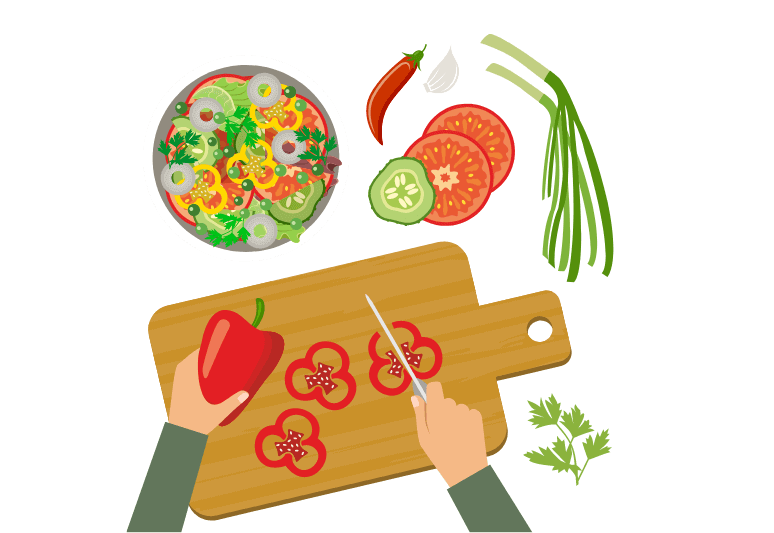
Nutritional requirements for a dog are something that promises the well-being of your furry fellow.
In this article, we provided information to a pet parent regarding their dog’s nutritional requirements.
That being said, there is nothing left but to thank you for your attention up to this point.
I hope I have been helpful, and I wish you many moments of joy and satisfaction in the company of your beloved dog. If you still have any queries, do let me know.
PS: If you think this is a well-informative article, please feel free to share it with your friends, and don’t forget to check Ollie’s website.
Until next time!
Good luck!

